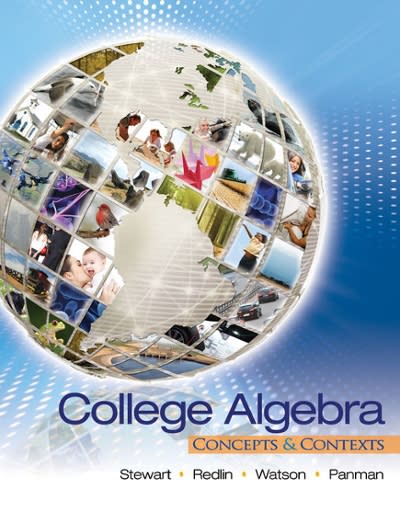Question
1) A red six-sided die is rolled, and the result is recorded. Then a green six-sided die is rolled, and the result is also recorded.
1) A red six-sided die is rolled, and the result is recorded. Then a green six-sided die is rolled, and the result is also recorded. a) Construct a tree diagram that displays the possible results of this two-step experiment. b) How many possible outcomes are there for this experiment? c) If the sum of the two rolls is computed, in how many ways could the sum be equal to seven? d) What is the likelihood that the two rolls of the dice result in a sum of seven? [Hint: the "likelihood" (or "probability") of something happening can be computed by dividing the number of ways that event can happen by the total number of possible outcomes.]
2) A brown bag contains five marbles: two white marbles, two black marbles, and one red marble. Without looking, you reach into the bag and draw out one marble. You record its color, and then keep the marble out of the bag (do not return it to the bag). You then reach into the bag again, draw out another marble, and record its color. a) Draw a tree diagram that displays the possible results of this two-step experiment. b) How many possible outcomes are there for this experiment? c) What is the likelihood of drawing one black marble and one red marble (in either order)? [Hint: the "likelihood" (or "probability") of something happening can be computed by dividing the number of ways that event can happen by the total number of possible outcomes.]
3) A penny is flipped, and the result (H = heads or T = tails) is recorded. A nickel is then flipped, and the result is recorded. A dime is then flipped, and the result is recorded. Finally, a quarter is flipped, and the result is recorded. a) Draw a tree diagram that displays all possible results of this experiment. b) How many possible outcomes are there for this experiment? c) What is the likelihood that exactly three of the coins will land on heads? d) What is the likelihood that exactly two of the coins will land on tails?
4) A bit string is a sequence (or string) of binary digits (0 or 1). a) Draw a tree diagram that displays all possible bit strings of length three. b) How many bit strings of length three are possible? c) What is the likelihood that a bit string of length three has at least two 0s in it?
5) A brown bag contains three red marbles, one black marble, and one white marble. A marble is randomly chosen from the bag, its color is recorded, and it is then placed back in the bag. Then another marble (possibly the same as the first marble) is again randomly chosen from the bag, and its color is recorded. 1) Draw a tree diagram that shows all 25 outcomes for the color of the two marbles drawn. 2) What is the likelihood of drawing a red marble twice? 3) What is the likelihood of drawing a black marble twice?
6) U = { 0, 1, 2, 3, 4, 5, 6, 7, 8, 9, 10, 11, 12, 13, 14, 15 } universal set A = { 1, 2, 4, 6, 14, 15 } ,
B = { 2, 3, 5, 10, 11 }, C = { 4, 6, 9, 13 }, D = even numbers, E = numbers greater than
A) ( )
B) ( )
c) ( )
d) ( ( ) )
e) ( ( ) )
10) Compute the probability of tossing a six-sided die and getting a number less than 3. Counting 9-310 |
11) If you pick one card at random from a standard deck of cards, what is the probability it will be a King?
12) If you pick one card at random from a standard deck of cards, what is the probability it will be a Diamond?
13) Compute the probability of rolling a 12-sided die and getting a number other than 8.
14) If you pick one card at random from a standard deck of cards, what is the probability it is not the Ace of Spades?
15) Referring to the grade table from question #7, what is the probability that a student chosen at random did NOT earn a C?
16) Referring to the credit card table from question #8, what is the probability that a person chosen at random has at least one credit card?
17) A six-sided die is rolled twice. What is the probability of showing a 6 on both rolls?
18) A fair coin is flipped twice. What is the probability of showing heads on both flips?
19) A six-sided die is rolled twice. What is the probability of showing a 5 on the first roll and an even number on the second roll?
20) Suppose that 21% of people own dogs. If you pick two people at random, what is the probability that they both own a dog?
Step by Step Solution
There are 3 Steps involved in it
Step: 1

Get Instant Access to Expert-Tailored Solutions
See step-by-step solutions with expert insights and AI powered tools for academic success
Step: 2

Step: 3

Ace Your Homework with AI
Get the answers you need in no time with our AI-driven, step-by-step assistance
Get Started


